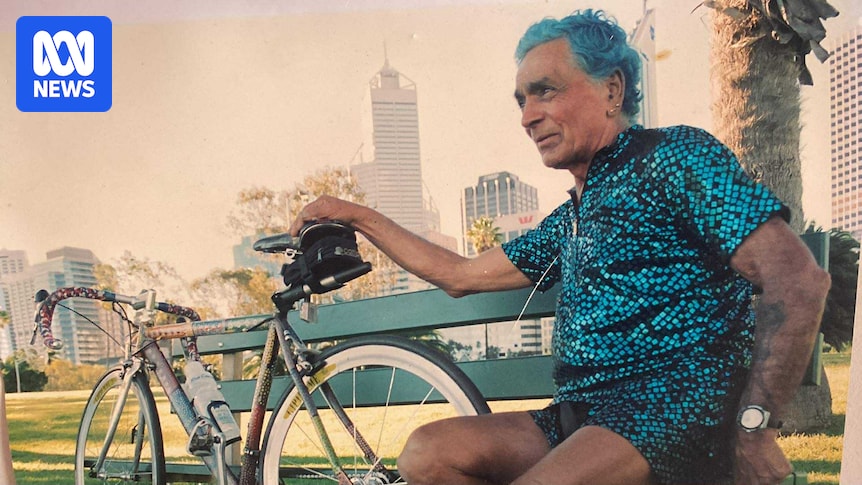Aboriginal and Torres Strait Islander readers are advised this article contains the image and name of a person who has died, with the permission of their family.
Thirty years ago, Alby Clarke got a shock message: either get healthy or die young.
Sixty years old at the time, the respected Gunditjmara elder took this directive to the extreme.
He transformed into a long-distance runner and cyclist, using his endurance feats to advocate for Indigenous reconciliation and health.
Also known for his flash of electric blue hair and mischievous grin, Mr Clarke died aged 90 last month, on September 16.
From poor health to endurance athlete
Mr Clarke was born in Melbourne in 1934 but relocated with his family to the Framlingham Aboriginal Reserve, near Warrnambool, as a 10-year-old when his father died.
His family said he discovered cycling as a youngster and won local competitions as a teenager.
Alby Clarke began cycling as a teenager, before picking up the sport again in later life. (Supplied: April Clarke)
In his 60s, Mr Clarke was battling type 2 diabetes and was warned by a doctor that he risked an early death if he didn’t improve his health.
It was the wake-up call he needed.
Driven by the desire to have more time with his family, he immediately quit drinking alcohol and began exercising.
“I had to get that big belly off,” he told the ABC in 2017.
Alby Clarke has been described as the “endurance athlete with a heart of gold”. (Supplied: April Clarke)
“I had a choice, whether to exercise and do something about it, or die … so I done [sic] something about it.
“You want a good life? A happy life? Do something about it, it’s up to you,” he told the ABC before his death.
Everything changed when he hopped on the bike again and started pedalling, riding a 6-kilometre circuit around the Framlingham settlement where he lived.
“Back in the day, when I had diabetes, I couldn’t even walk it, my feet were hurting that much,” he said.
Record-breaking feats
Those loops at Framlingham were the first of thousands of kilometres Clarke would cover in his later life.
Aged 66, he became the first Indigenous rider to complete the 275km Melbourne to Warrnambool Classic bike race in 2001.
Alby Clarke cycling across the Nullarbor in 2002. (Supplied: April Clarke)
The following year, he cycled 3,000km across the Nullabor from Perth to Warrnambool.
Dubbed the Ride For Reconciliation, Mr Clarke completed the journey dressed in a blue outfit covered in sequins, matching his trademark dyed-blue hair.
The bicycle Alby Clarke rode from Perth to Warrnambool is on display at the National Museum of Australia. (Supplied: National Museum of Australia)
In 2005, the 70-year-old swapped the bike for running shoes and covered 347km in the Cliff Young Ultra Race in Colac for his first official effort.
And he kept running up until he was 88, when he completed his final half-marathon near Warrnambool in 2023.
His endurance and advocacy efforts earned him a number of awards, including a Medal in the Order of Australia for his contributions to Indigenous health and sport, a Victorian Senior of the Year award, and an induction onto the Victorian Indigenous Honour Roll.
Alby Clarke was awarded a Medal in the Order of Australia in 2015 . (Supplied: April Clarke)
‘Rode and ran to freedom’
At his funeral in Warrnambool last month, his daughter, April Clarke, spoke of how her father’s resilience was evident beyond his athletic feats.
People attending Alby Clarke’s funeral were encouraged to wear a touch of blue. (ABC South West Victoria: Jean Bell)
“Dad exceeded all expectations as an Aboriginal man,” Ms Clarke said.
“Firstly, he survived until the age of 90. Not only did he survive, but he lived, and not just existed.
“Dad was advocating for our people to be seen, to be celebrated, to be equal in their own country, to be treated as human beings.”
She touched on her father’s struggles with alcohol and how transforming his lifestyle required leaving old habits and old friendships behind.
About 200 people turned out to celebrate Alby Clarke’s life at his funeral in Warrnambool. (ABC South West Victoria: Jean Bell)
“What you don’t hear is how hard that journey was for him,” Ms Clarke said.
“He told me numerous times how lonely it was to create a change in your life.
“Your circle of brother boys changed because you … no longer want to sit around drinking.
“Dad said you had to be tough and courageous to do it alone, but you can do it.
“So he rode and ran to freedom.”
Moyne Shire Councillor Jordan Lockett was among the community members who attended Mr Clarke’s funeral.
Cr Lockett said Mr Clarke’s life illustrated how resilience and determination can overcome health issues and age.
“To have that kind of health warning, but then turn [health and fitness] into his life mission is a remarkable story,” he said.
“He’s a national treasure — if anyone is deserving of a statue, then it’s this man.”

